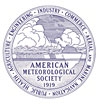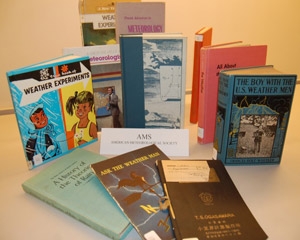The Niels Bohr Library and Archives (NBL&A) collects books, oral histories, and photographs to document the history of physics, astronomy, geophysics, and related sciences, and we collect the archival record of AIP and all of its Member Societies. When the American Meteorological Society (AMS) joined our federation in 2013, we embraced the opportunity to expand our coverage of the physical sciences to include meteorology and climate science.

Our first phase of meteorology collection development began in 2014, when we hired Roger Turner (PhD in History and Sociology of Science, and member of AMS) to develop a bibliography of around 500 meteorology titles to add to our book collection. Through donations and purchases we have added more than 200 meteorological titles since the project began. (If you are interested in helping the library grow its meteorology book collection, please check our list of meteorology titles.)

In our second phase, we are focusing on our role as a clearinghouse of information in the history of physics. As part of this role, we maintain our International Catalog of Sources (ICOS), an online union catalog of archival resources in the history of the physical sciences with more than 10,000 collections from 900 repositories worldwide. Each year, the staff of the Niels Bohr Library and Archives surveys about 100 archival repositories for new information on manuscript collections. We report the survey results in our newsletter and add descriptions to ICOS. Historically, we have focused on collections in astronomy, crystallography, optics, rheology, acoustics, and other fields related to physics and the physical sciences. With the addition of AMS to the AIP federation, we’ve added meteorology and climate science to that list.
With the continuing help of Roger Turner, we are expanding our annual surveys to include universities and other leading meteorology and climate science institutions, as well as individual meteorologists, climate scientists, and AMS award winners whose personal papers represent important historical resources. Our 2014 surveys were the first to include meteorology, and our findings include the papers of Arnold Guyot and Luna Leopold, the records of the Smithsonian Institution Meteorological Project, and the online finding aid for the papers of Edward Lorenz:

Arnold Guyot collection
(Princeton University Special Collections): Correspondence, documents, and related material by and about Arnold Guyot, the Swiss-born American geologist, geographer, and educator whose extensive meteorological observations led to the founding of the US Weather Bureau.- Luna Leopold papers (American Philosophical Society Library): Correspondence, personal journals, and field notebooks of Luna Leopold, geophysicists and meteorologist known for his work in hydrology and fluvial geomorphology.
- Edward Lorenz papers (finding aid now available online, Library of Congress, Manuscript Division): Correspondence, writings, photographs, and other papers documenting Edward Lorenz’s career as a professor of meteorology at Massachusetts Institute of Technology and his discovery of deterministic chaos.
- Smithsonian Institution Meteorological Project records (Smithsonian Institution Archives): Joseph Henry’s first major project for the Smithsonian was his plan to obtain weather reports from a countrywide network of voluntary observers; his plan is detailed in these records, including correspondence and meteorological data.
To see descriptions of additional meteorology collections in our catalog, enter “meteorology” as a subject search term in ICOS.
In order to most effectively document the history of the physical sciences, the Niels Bohr Library and Archives does not endeavor to collect the records of scientists and their home institutions. Instead, we seek to unite them virtually, through ICOS.
We are pleased to expand our subject areas to include the interests of AIP’s newest Member Society. The partnership will certainly bolster the richness and grow the scope of AIP’s history resources for the benefit of the entire community.
